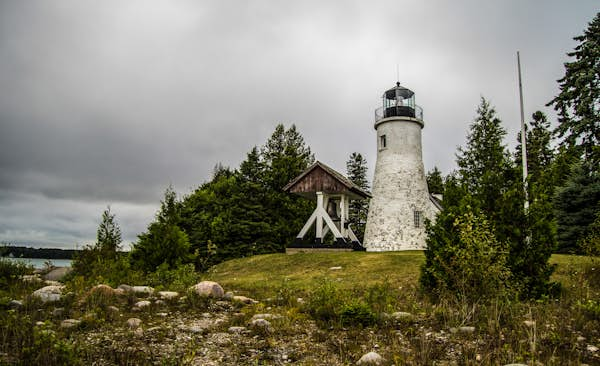Michigan is hemmed in by water on three sides. Along the western shoreline, beach towns across Lake Michigan from Chicago teem with dune hikers, stand-up paddle boarders, and oenophiles sipping their way toward the grapevine-twined peninsulas of Traverse City. It’s no wonder a gem like Alpena can hide in plain sight on the other side of the state. But this tiny town tucked into northeast Michigan’s Thunder Bay packs a big punch.
To get to Alpena, take your pick of several woodsy two-lane highways – most notably, the US 23 Heritage Route, easily accessible for those leaving Detroit in search of outdoor adventure. From crackling frozen beaches in winter to iris-strewn wooded trails in summer, Alpena County welcome nature lovers year-round. Here’s how to dive into Alpena’s under-the-radar great outdoors.

Hike through the sunken forest of Mystery Valley
Lush, wooded sinkholes dot the earth of northeast Michigan. Though most remain on private property, hikers can explore several sunken forests near Alpena. The atmosphere within the slumped terrain fosters flora and geological specimens not typically found in the region.
For an easy afternoon hike, set your sites on Mystery Valley (GPS 45.21225, -83.73243). Two trails, Earthcrack and Valley, cut through the collapsed landscape. Keep watch for the disappearing lake, which seasonally rises to the surface or drains into recessed sinkholes. In Mystery Valley, it’s not uncommon to find fossilized clam-like brachiopods left from the sea 400 million years ago.
Twelve miles north of Alpena, Rockport State Recreation Area offers a rare chance to take home ancient fossils you’ve unearthed yourself (visitors can legally haul home 25 pounds per year). For locals, Rockport is also a popular space for biking and hiking.
Related: Where to see dinosaurs in the American West

Brave snow-packed trails on fat-tire bikes or snowshoes
To visit Alpena in the dead of winter is to embrace the cold. On average, a 6-inch blanket of snow insulates the county by New Year’s Day, and snowbanks expand for months to come. Rather than spending the whole weekend indulging at locally-owned Austin Bros. Beer Company or warming up with mugs of coffee at the antler-festooned Cabin Creek Coffee, plunge into the frozen world outside for a while first.
At Besser Natural Area, snowshoe or bike along a 1-mile path over through the woods to Bell, a logging village abandoned since 1915. Not much is left aside from an innocuous chimney and a few walls. Still, rumor has it the ghost town is haunted. If you prefer the thrill of icy wind in your hair, snowmobiling is a viable winter sport in northern Michigan. The Alpena Snowdrifters have jetted through snowy pine forests (carefully avoiding dozens of deer) for more than 50 years.

Glide over shipwrecks in Thunder Bay
Alpena visitors get a front-row seat to the 99 shipwrecks mapped in Thunder Bay National Marine Sanctuary. Up to 200 boats met their deadly end in the Lake Huron shipping lane known as Shipwreck Alley. To understand why, stop by the Great Lakes Maritime Heritage Center before pushing off.
There’s more than one way to float over the wreckage on a sunny day in Alpena. Families with young children often opt for viewing via Alpena Shipwreck Tours’ glass-bottom boat, but it’s possible to explore the shipwrecks independently on a stand up paddleboard (SUP) or kayak.

Explore Shipwreck Alley underwater
In the summer, Alpena is replete with chances to fully immerse yourself in the water – and its history. Inland lakes are a sanctuary for swimmers and sunbathers, while adventurers head for the deep blue waters and sunken ships of Lake Huron.
Alpena County’s ‘Shipwreck Alley’ is open for underwater exploration no matter your experience level. Snorkeling tours and scuba diving equipment rentals are available at dive and gear shops near the quaint downtown thoroughfare.
Related: Dive into Great Lakes history in Northern Michigan
8 national parks where the best views are underwater

Stargaze at a Dark Sky Preserve
Headlands International Dark Sky Park (about a two-hour drive from Alpena) is Michigan’s only globally recognized dark sky preserve. But Alpena County boasts three state-designated locations: Rockport State Recreation Area, Thompson’s Harbor State Park, and Negwegon State Park. This trio of public lands gives locals and visitors a spectacular nightly glimpse of the Milky Way.
For easy access from the parking lot and a handful of picnic tables, head to Rockport State Recreation Area. Listen to the waves crash against the rocks on a windy day or the rustle of nocturnal wildlife on a summer night.
Thompson’s Harbor State Park flaunts its natural beauty in springtime, when the largest population of Michigan’s state wildflower, the Dwarf Lake Iris, unveils a splash of color for those who arrive before the sun goes down. The park’s sand dunes are ideal for a summer picnic before reclining back to watch Ursa Minor peek out.
Negwegon State Park is the most remote Dark Sky Preserve of the three. If you’re heading to this 4,118-acre park, take extra caution during nighttime driving. Due to its lakeside setting, several roads are too sandy to traverse without four-wheel drive. For those willing to make the back-country trek, schedule enough time for a hike through the aspen-and-pine forests before settling on the shoreline to watch the stars light up the night.
Whether you visit one or all three of the Dark Sky Preserves, the remote forests and expansive lake waters outside Alpena keep the area low on light pollution 365 days a year. Hence, visitors can sit back and soak in a range of cosmic activities, like dazzling meteor showers and the shimmering northern lights.
